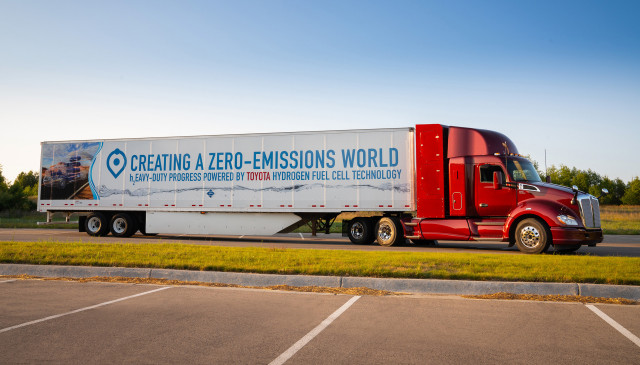
Toyota Project Portal 2.0 fuel cell-powered semi-trailer truck
After showing its second-generation fuel-cell semi-truck at the Port of Los Angeles in July, Toyota announced last week it will build 10 more fuel-cell trucks for the project.
In addition to the trucks, the project will add two new heavy-duty hydrogen filling stations, two new hydrogen forklifts at Toyota's warehouse at the next-door Port of Long Beach, and two new zero-emissions yard tractors at the nearby Port of Hueneme.
The California Air Resources Board will provided $41 million of funding for the project. Toyota, Shell, and Kenworth, which builds the trucks, will provide the balance of the project costs, which totals $82 million.
READ THIS: Toyota introduces second hydrogen fuel-cell powered semi working in Los Angeles
The Port of Los Angeles is the largest in the country, and has been targeted by the state for investments in zero emissions technology.
In July, Toyota revealed its second-generation fuel-cell semi truck after operating a proof-of-concept prototype for the previous year. The updated model can go 300 miles between hydrogen refills, rather than 200 for the initial truck, and has a small sleeper in the back of the cab, which the first truck lacked.
The trucks use two fuel-cell stacks from the Toyota Mirai fuel-cell car to deliver 670 horsepower and 1,325 pound-feet of torque, and include a 12-kwh battery pack to store power.
CHECK OUT: Toyota 'Project Portal' hydrogen fuel-cell heavy-duty semi tractor as proof of concept
The trucks will ferry cargo from the Port of LA to Ontario, California, where Shell is installing the two new hydrogen filling stations to complement facilities already in the Port of LA.
The projects are part of Toyota's efforts to eliminate CO2 emissions from its logistics facility in the next-door Port of Long Beach, where it is building a combined power facility to produce electricity, water, and hydrogen to power the trucks from agricultural wastes.
DON'T MISS: California utilities commission passes record incentives for chargers
The ports of Los Angeles and Long Beach are a primary focus of California's efforts to clean up its air. About 40 percent of all imports and exports traveling to and from the U.S. come through the ports, creating a concentration of diesel trucks that has been linked to poor health in the area.
California is expanding efforts to replace those trucks with zero-emissions battery-electric and fuel-cell replacements. Toyota's agreement is the largest part of the hydrogen initiative in the area. The state is also expanding infrastructure to charge a growing number of electric drayage trucks and other equipment at the facility.